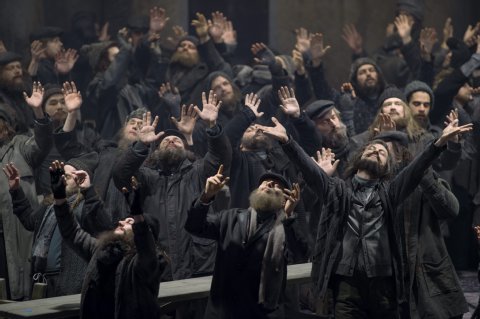A fire in the Chiesa Madre in Favara, Sicily, has destroyed the historic organ.
The cause is thought to have been an electrical fault.

A fire in the Chiesa Madre in Favara, Sicily, has destroyed the historic organ.
The cause is thought to have been an electrical fault.

Heinrich Isaac’s plangent farewell to Innsbruck, one of the earliest chorales I learned by heart.

Conducting the BRSO season-ender in Munich, he says this of the Gasteig: ‘This is not anyone’s favourite concert hall in the world. It’s a difficult place, it’s a dry place. You have to fill it with the humanity that it won’t naturally give you.’
Mariss Jansons, the last BRSO music director, campaigned to his final breath to get a new hall. Could Simon be raising his baton?
Especially as his London hall is a non-starter.
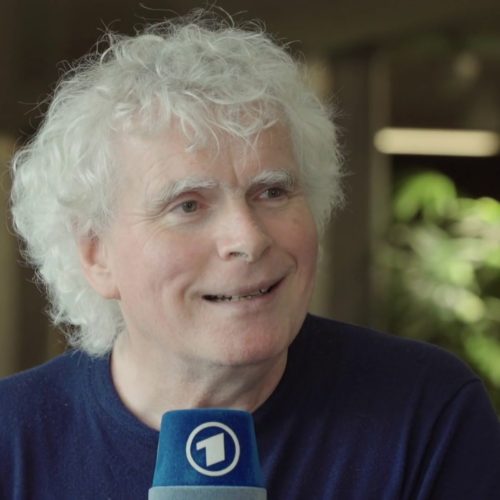
James Brown, whose Hazard Chase agency went bust in the opening week of UK Covid lockdown, has bounced back with James Brown Management, representing some of his old artists.
The headliners are conductor Olli Mustonen, Caros Izacray, Matthew Halls (pic), Alpesh Chauhan and Anthony Marwood, pianist Benjamin Grosvenor, violinist Viviane Hagner and cellist Laura van der Heijden.
This is an ideal moment for boutique management as big agencies struggle for survival. Not that anyone’s booking much right now.

The Bulgarian-born US cellist Petia Kassarova, a member of the Albany Symphony Orchestra, has succumbed to cancer.
Music Director David Alan Miller writes: ‘I am simply heartbroken that my dear friend, Petia Kassarova, died today after her long battle with cancer. Petia was a superstar member of our Albany Symphony cello section for many years. She was a brilliant artist and teacher, and one of the most thoughtful, gentlest people I have known. She had a kind word for everyone, and the most encouraging, radiant smile. It simply lit up the room. Our love goes out to her devoted, loving husband, Krassimir. She will always be in our hearts, and when we are together again on stage, we will play for her.’
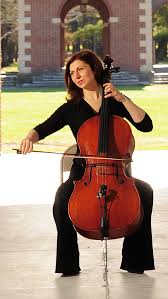
Max Raimi of the Chicago Symphony takes issue with the New York Times’s demand to abolish blind auditions:
To promote greater diversity in our symphony orchestras, The New York Times’ chief classical music critic Anthony Tommasini proposes that auditions should no longer be held behind a screen. Here is an excerpt from his article: “Blind auditions are based on an appealing premise of pure meritocracy: An orchestra should be built from the very best players, period. But ask anyone in the field, and you’ll learn that over the past century of increasingly professionalized training, there has come to be remarkably little difference between players at the top tier. There is an athletic component to playing an instrument, and as with sprinters, gymnasts and tennis pros, the basic level of technical skill among American instrumentalists has steadily risen. A typical orchestral audition might end up attracting dozens of people who are essentially indistinguishable in their musicianship and technique.”
“Ask anyone”? Nobody asked me. I play viola in the Chicago Symphony. A significant percentage, very possibly a majority of our auditions, end up with us failing to hire a musician. I am currently on the audition committee to find a new Principal Viola. We have had two rounds of auditions—prelims, semis, and finals—and have heard well over 100 candidates. We even tried out two of the more promising players, having them play a few concerts as Principal. The committee and our Music Director, Riccardo Muti, have been in agreement that none of the candidates meet our standards. Mr. Tommasini’s premise, that there is any number of more-or-less interchangeable candidates who can fill the openings in our major orchestras and the decision of which of them to select is essentially arbitrary is a fantasy. Unfortunately, once the pandemic allows it, we will again be back at square one, sitting for hours and days on end listening to one violist after another play Strauss orchestral excerpts.
The statement I cited was troubling for another reason as well. Mr. Tommasini talks about the “athletic component to playing an instrument”, comparing us to “sprinters, gymnasts and tennis pros”. Fair enough. But then, in a splendid sleight-of-hand, he talks about “dozens of people who are essentially indistinguishable in their musicianship and technique.” Disingenuously, he inserts “musicianship” into it; this has no parallel in his athletic metaphor.
Many years ago, our former Music Director here in Chicago, Daniel Barenboim, insisted that we have violists play the opening of the solo viola part to Mozart’s “Sinfonia Concertante” at auditions. It is not at all technically demanding. But I was astonished at how after six measures—perhaps twelve seconds of music—I knew everything I needed to know about whomever I was listening to.
The viola in this passage, in octaves with a solo violin, rises an octave on E Flats, the lower one a grace note, the upper one held for more than two bars that call for a crescendo and then a diminuendo. The music then meanders down the E Flat major scale, taking a scenic route with brief digressions. At first, the soloists are all but inaudible, lost in the sympathetic vibrations of the E Flats in the orchestra. Miraculously, at some point in the crescendo, we become aware of the soloists. It is as if they have always been there, since the beginning of time, but we hadn’t noticed.
The violist, in a matter of seconds, must transform his or her sound from a shadow to a physical presence, and then contrive to sing the circuitous downward line in one uninterrupted phrase, lyrically and yet with utter simplicity. E flat is a notoriously hard key to play in tune. The music is sufficiently slow so that your sound and intonation are stripped naked; the passage comes off as either absolutely gorgeous or grotesquely flawed.
The reason that this little except works so well in auditions is because it crystalizes perfectly what we are looking for in a colleague. The technical command that Mr. Tommasini references is a given; our search goes far beyond this. What is required is a concept, a way to tell a story with sound, with phrasing, with dynamics, and with every other resource at our command. Mr. Tommasini would reduce the criteria by which we evaluate candidates for our orchestra to speed and accuracy; judging us as one might judge a stenographer. I find it quite frankly offensive.
An argument can be made that hiring musicians of color is of such importance for the place of orchestras in our society that it should perhaps be a higher priority than necessarily finding the best musician for every opening. If Mr. Tommasini wishes to make that argument, it is a discussion well worth having. But to say that there are so many people who can step into our major orchestras and perform at the highest level that it doesn’t matter which of several candidates get the job (so we might as well take the musician of color) is simply not true.
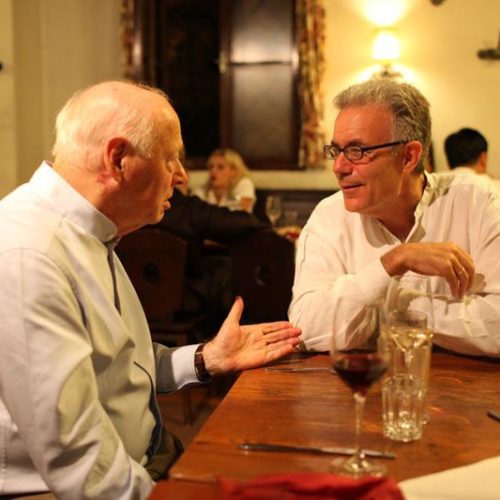
Max Raimi arguing it out with Bernard Haitink
The New York violinist Karen Marie Marmer, who starred with her husband Jorg-Michael Schwarz in theRebel Baroque Ensemble, has died at 63.
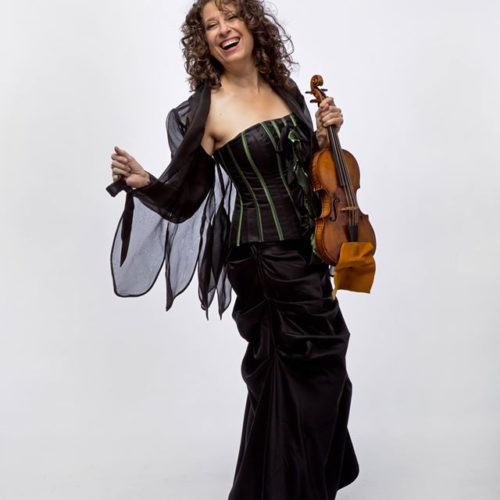
She had some pedigree: She studied violin at the Aaron Copland School of Music at Queens College with Israel Chorberg and Ruth Waterman and at the Yale School of Music with Syoko Aki. Her baroque violin studies were with Jaap Schroeder at Yale, Marilyn MacDonald at the Baroque Performance Institute at Oberlin and with Lucy van Dael at the Royal Conservatory in The Hague.
Alongside music, Ms. Marmer’s interests include performance art, poetry, acting, environmental and historic preservation, the diverse spiritual traditions of the world and mysticism, with a special focus on the Kabbalah. She is trained in several healing modalities and is a certified instructor of Laughter Yoga.
We’re hearing that one leading London agency has fired just over half its staff and another has dismissed one third.
The reductions come as the Government’s furlough payments are coming to an end. By stripping down now, agencies are seeking to avoid massive redundancy payouts.
The firings are not going down well with artists. We hear that one famous conductor has received a legal warning that he would be in breach of contract if he departed the agency together with his fired personal manager.
There will be turmoil ahead.

In response to an outcry over anti-BLM comments that he made on Facebook, David Tucker has been sacked from the board of his father’s foundation for developing young singers.
The Richard Tucker Music Foundation condemns the hurtful and offensive comments made by one of our Board members, David Tucker. David has been removed from the Richard Tucker Foundation Board of Directors, effective immediately. David’s opinions do not align with the beliefs and mission of the Richard Tucker Music Foundation, a Foundation built on the legacy of a Jewish-American singer who sought to bridge religious and cultural differences.
The Foundation recognizes the need to find ways we can better apply core values of equality and inclusion across our organization and programs. We know that we can improve our auditions and awards process to create more equitable opportunities and increase diversity organization-wide. To this end, we are currently assembling a diversity advisory task force of artists and thought leaders to address these issues. We look forward to openly sharing our next steps and continuing to support the next generation of operatic talent. – Jeffrey Manocherian, Chairman, and Barry Tucker, President, Richard Tucker Music Foundation Board of Directors

Deutsche Grammophon is planning to stream Tosca from Naples with Anna Netrebko on July 30.
DG Stage will charge 12.90 Euros per view, taking the record business into direct competition with opera houses like the Met that are aiming to stream their own events.
Competition is healthy. Let’s see how the numbers pan out.
Press release: Opera-lovers will be able to watch an open-air production of Puccini’s Tosca staged at the Piazza del Plebiscito in Naples by the Teatro San Carlo and starring Anna Netrebko, Yusif Eyvazov and Ludovic Tézier on 30 July. “We’re thrilled at the thought of being back on stage,” said Netrebko and Eyvazov. “Presenting Tosca to the world from this stunning outdoor theatre will be an unforgettable experience.”
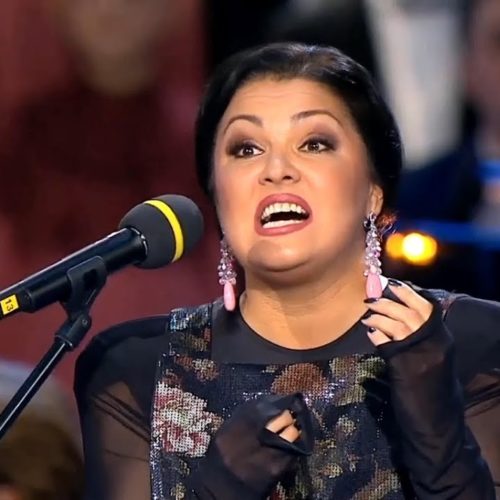
The new Bayreuth Baroque opera festival has been confirmed for early September in the Margrave’s Opera House.
Highlights include a premiere of Nicola Antonio Porpora’s “Carlo il Calvo” and Leonardo Vinci’s “Gismondo, Re di Polonia”. Both audiences and performers will be required to wear masks.

Amid rising public pressure, the Berlin Senate has begun to review a ban on public choir singing that extends to the end of October.
Cultural senator Klaus Lederer is meeting scientists today with a view to revising the requirements for choral singing. He intends to form a group of virologists, pneumologists, church and choir representatives and ventilation experts to draw up new protocols for a minimum distance between the singers, among other rules.
Berlin is stricter than for the rest of Germany in its choir clampdown.
